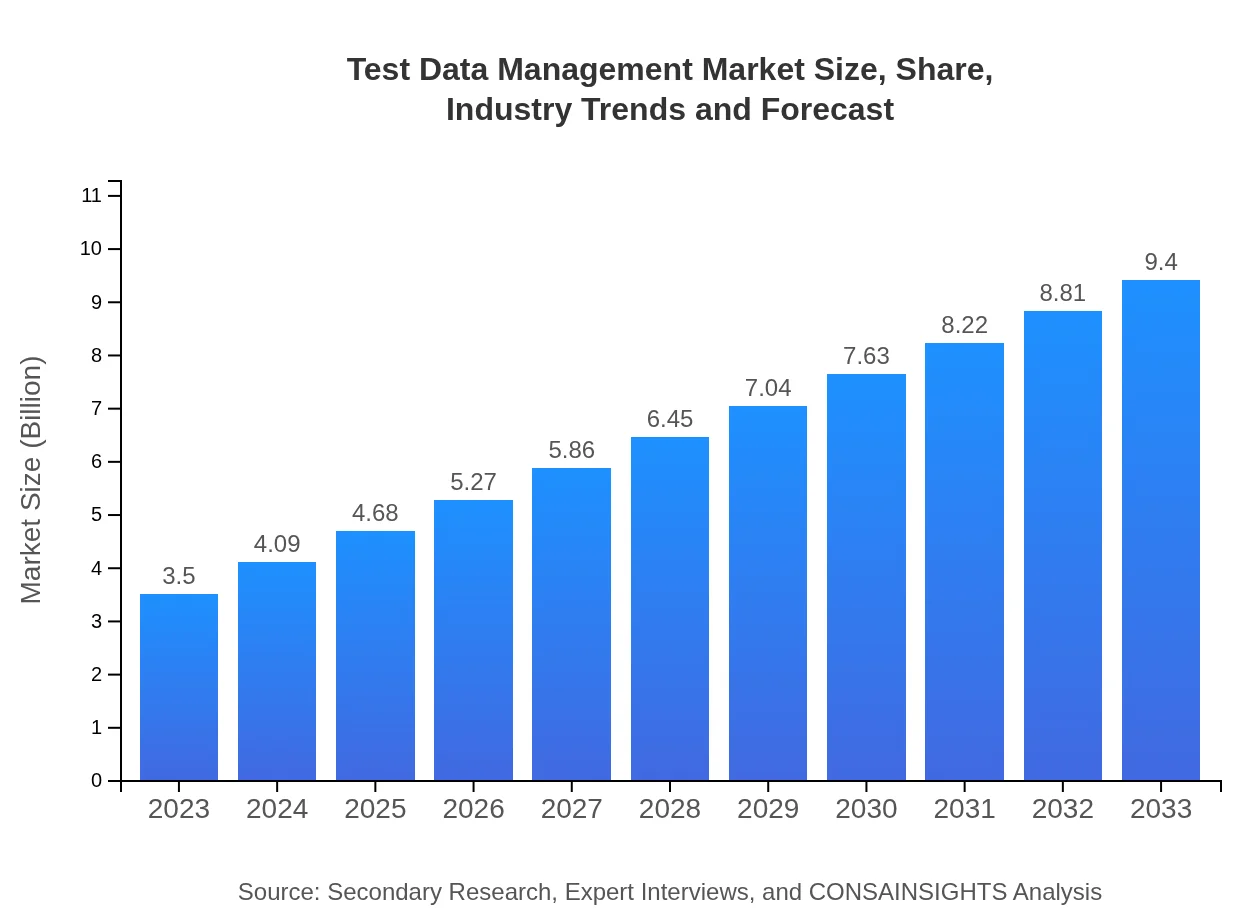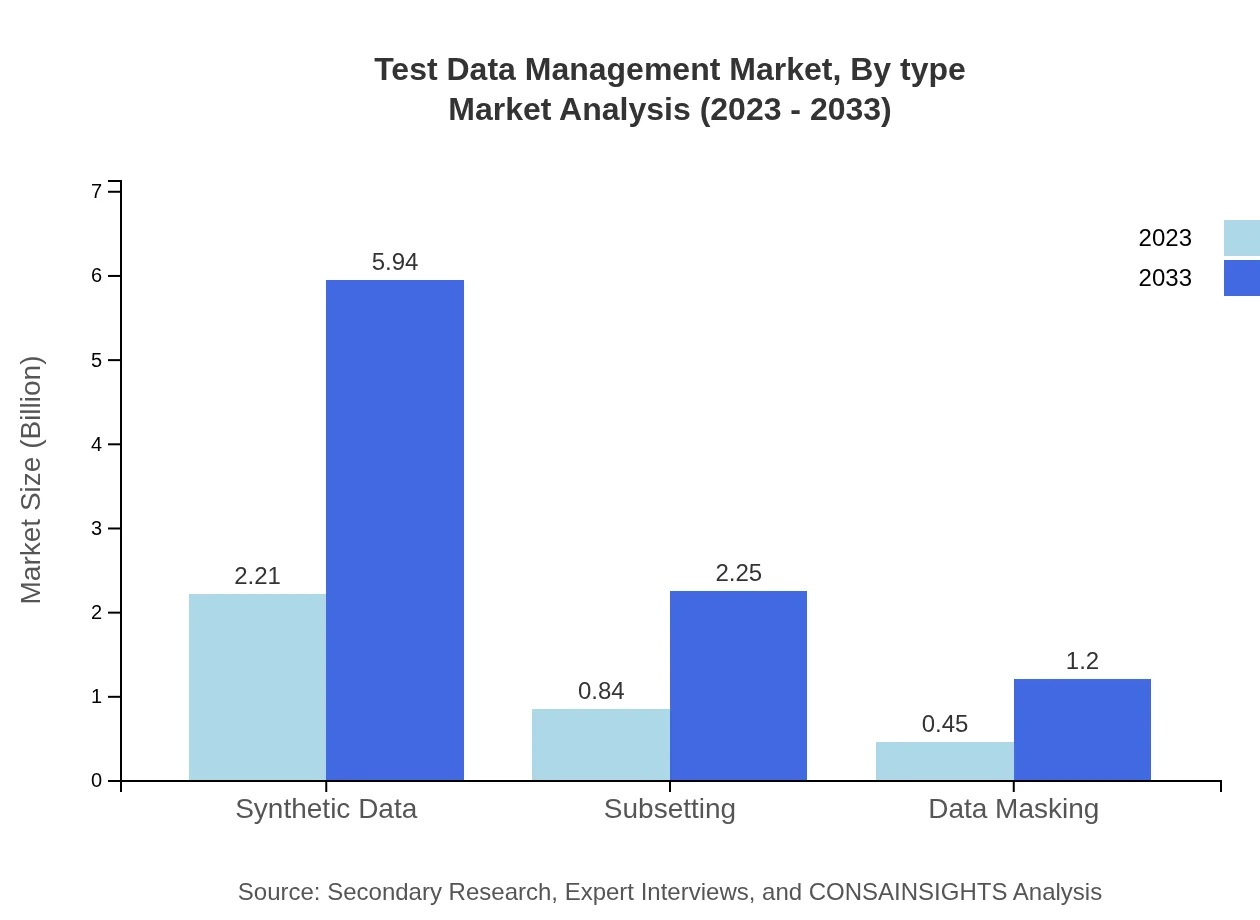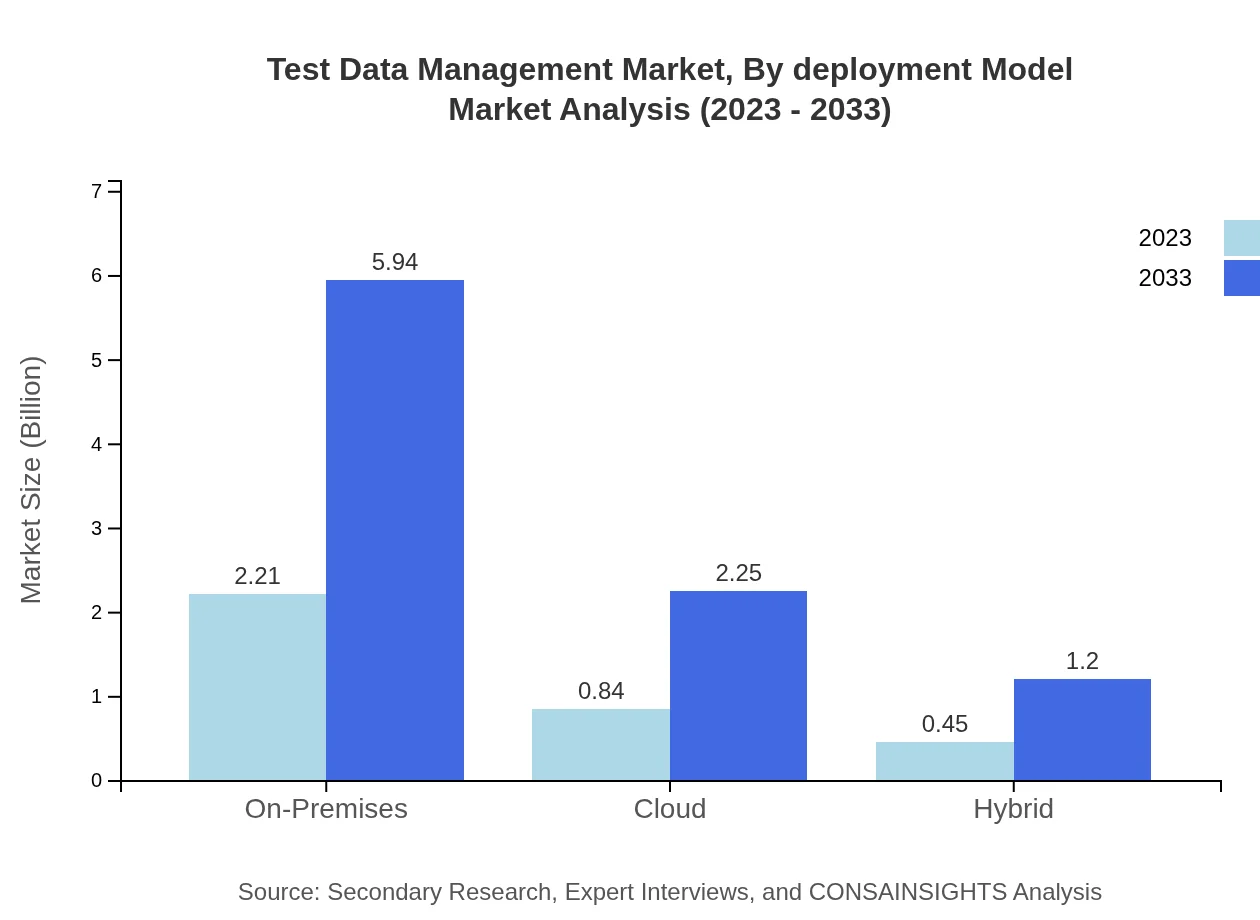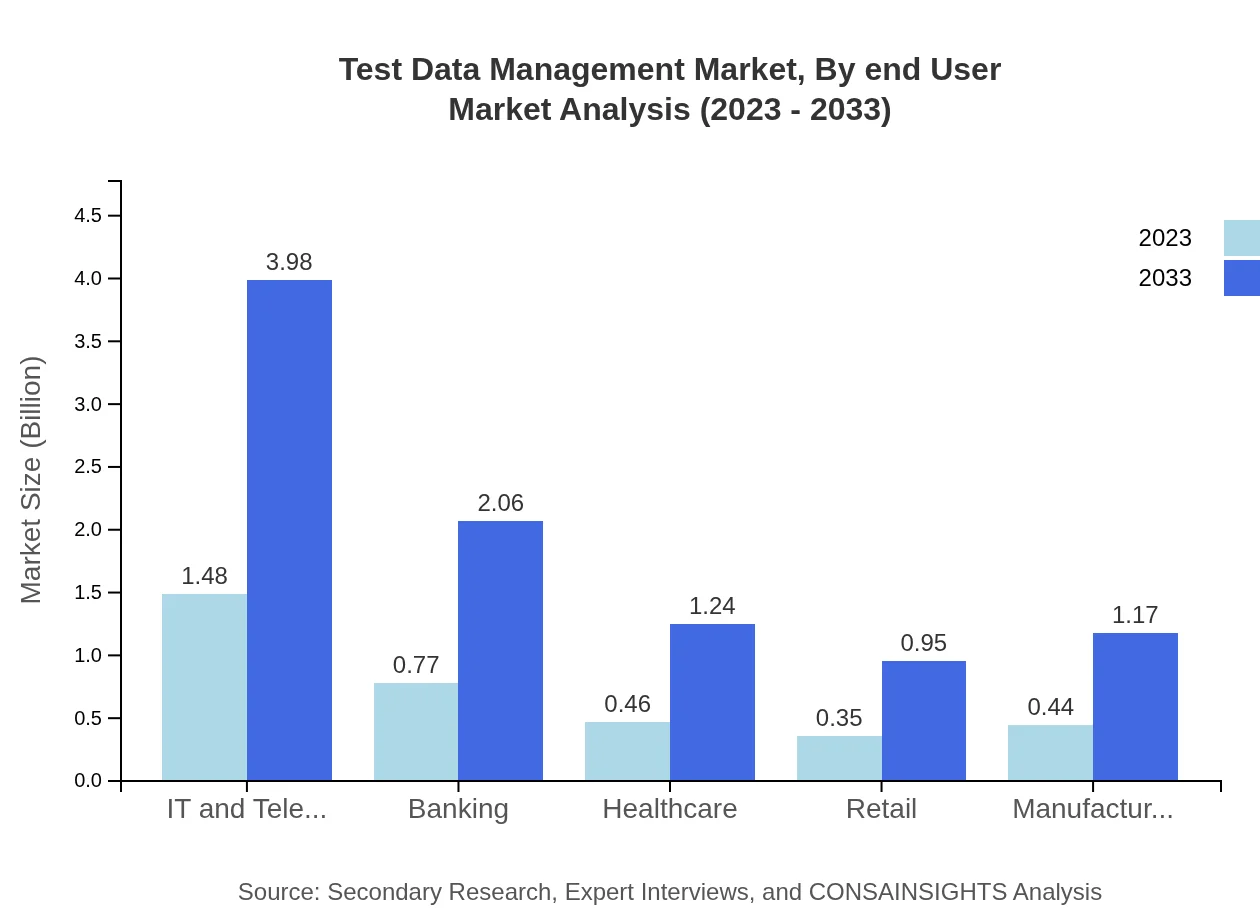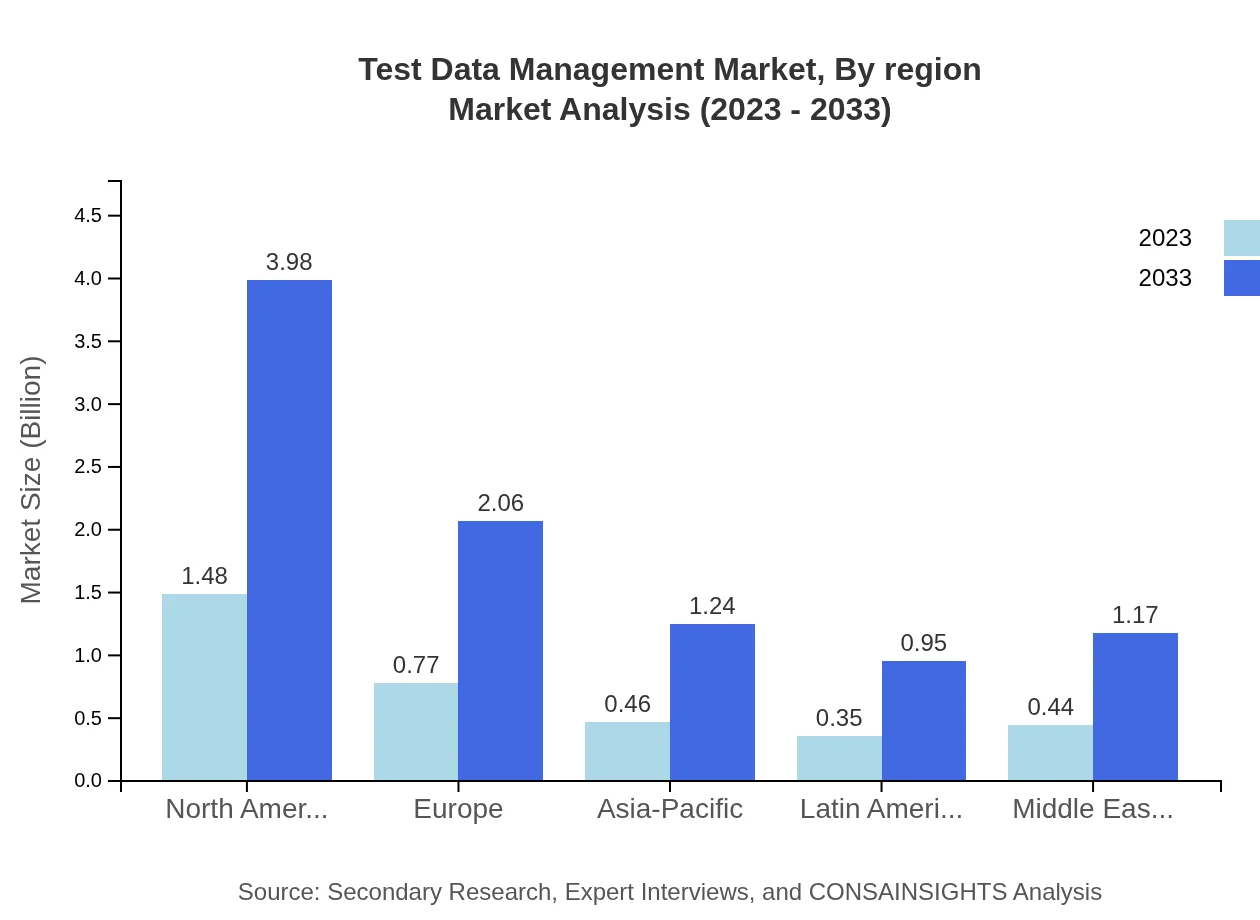Test Data Management Market Report
Published Date: 31 January 2026 | Report Code: test-data-management
Test Data Management Market Size, Share, Industry Trends and Forecast to 2033
This report delves into the Test Data Management market, providing a comprehensive analysis of market dynamics, trends, and forecasts from 2023 to 2033. It highlights key insights, market segmentation, regional performance, and an overview of leading companies in the industry.
| Metric | Value |
|---|---|
| Study Period | 2023 - 2033 |
| 2023 Market Size | $3.50 Billion |
| CAGR (2023-2033) | 10% |
| 2033 Market Size | $9.40 Billion |
| Top Companies | IBM, Informatica, CA Technologies, Micro Focus, Compuware |
| Last Modified Date | 31 January 2026 |
Test Data Management Market Overview
Customize Test Data Management Market Report market research report
- ✔ Get in-depth analysis of Test Data Management market size, growth, and forecasts.
- ✔ Understand Test Data Management's regional dynamics and industry-specific trends.
- ✔ Identify potential applications, end-user demand, and growth segments in Test Data Management
What is the Market Size & CAGR of Test Data Management market in 2023?
Test Data Management Industry Analysis
Test Data Management Market Segmentation and Scope
Tell us your focus area and get a customized research report.
Test Data Management Market Analysis Report by Region
Europe Test Data Management Market Report:
Europe’s market is anticipated to expand from $1.17 billion in 2023 to $3.13 billion in 2033. Countries in this region are increasingly prioritizing compliance with data protection regulations, driving the demand for sophisticated TDM solutions.Asia Pacific Test Data Management Market Report:
The Asia Pacific TDM market is projected to grow from $0.64 billion in 2023 to $1.71 billion by 2033. The growth is fueled by increasing urbanization and the rapid digitization of businesses in countries like India and China, where stringent data compliance laws are driving investments in data management solutions.North America Test Data Management Market Report:
The North American market, valued at $1.20 billion in 2023, is forecasted to reach $3.22 billion by 2033. The region leads in adopting advanced TDM solutions due to the presence of major tech players and a strong focus on data privacy regulations like GDPR and CCPA.South America Test Data Management Market Report:
In South America, the TDM market is expected to grow from $0.07 billion in 2023 to $0.18 billion by 2033. The demand for advanced testing solutions in Brazilian and Argentinian businesses seeking efficient IT operations supports this growth, despite the region's economic challenges.Middle East & Africa Test Data Management Market Report:
The Middle East and Africa market is projected to grow from $0.43 billion in 2023 to $1.15 billion by 2033. Growth in this region is spurred by increased investments in IT infrastructure and a greater emphasis on data management compliance, particularly in the Gulf Cooperation Council (GCC) countries.Tell us your focus area and get a customized research report.
Test Data Management Market Analysis By Type
The Test Data Management market has seen significant growth across various types of solutions: Synthetic Data is expected to dominate with a market size rising from $2.21 billion in 2023 to $5.94 billion by 2033, representing 63.23% share in 2023, remaining steady over the forecast period. Subsetting and Data Masking are also crucial, with market sizes at $0.84 billion and $0.45 billion, respectively, in 2023.
Test Data Management Market Analysis By Deployment Model
Deployment models for TDM solutions have shown diverse growth patterns. On-Premises solutions currently hold the largest share at 63.23%, expected to grow from $2.21 billion in 2023 to $5.94 billion by 2033. Cloud-based solutions are also emerging, increasing from $0.84 billion to $2.25 billion, making up 23.95% of the market share.
Test Data Management Market Analysis By End User
The IT and Telecom sector remains the largest end-user segment in the TDM market, valued at $1.48 billion in 2023, projected to reach $3.98 billion by 2033. Other sectors like Banking, Healthcare, Retail, and Manufacturing also contribute significantly, with respective market shares of 21.91%, 13.17%, 10.06%, and 12.46% in 2023.
Test Data Management Market Analysis By Region
Regional segmentation reveals North America as the leading market, followed by Europe and the Asia Pacific. The continuous technological advancements and stringent data regulations in these regions are driving TDM adoption across various industries.
Test Data Management Market Trends and Future Forecast
Tell us your focus area and get a customized research report.
Global Market Leaders and Top Companies in Test Data Management Industry
IBM:
IBM offers robust TDM solutions incorporating AI and machine learning, facilitating effective data masking and provisioning.Informatica:
Informatica is a leader in cloud data management and provides advanced TDM capabilities that enhance testing processes.CA Technologies:
CA Technologies specializes in automated testing solutions and sophisticated TDM tools to ensure data accuracy and compliance.Micro Focus:
Micro Focus provides comprehensive TDM solutions focusing on enterprise-level data governance and security.Compuware:
Compuware delivers specialized TDM services tailored for mainframe and enterprise applications, enhancing efficiency.We're grateful to work with incredible clients.









FAQs
What is the market size of test Data Management?
The global Test Data Management market is valued at approximately $3.5 billion in 2023, with an expected compound annual growth rate (CAGR) of 10% from 2023 to 2033, indicating strong future growth prospects.
What are the key market players or companies in this test Data Management industry?
Key players in the Test Data Management industry include prominent companies like IBM, Informatica, CA Technologies, Compuware, and Micro Focus, which are known for their innovative solutions and robust market presence.
What are the primary factors driving the growth in the test Data Management industry?
Growth in the Test Data Management industry is driven by increased demand for data privacy, rising cloud adoption, the need for improved software quality, and compliance with regulations like GDPR and CCPA, ensuring data security.
Which region is the fastest Growing in the test Data Management?
The Asia Pacific region is identified as the fastest-growing area in the Test Data Management market, projected to grow from $0.64 billion in 2023 to $1.71 billion by 2033, indicating significant expansion opportunities.
Does ConsaInsights provide customized market report data for the test Data Management industry?
Yes, ConsaInsights offers customized market report data tailored to specific needs within the Test Data Management industry, ensuring in-depth and relevant insights for decision-making.
What deliverables can I expect from this test Data Management market research project?
Expect deliverables such as comprehensive market reports, trend analysis, regional insights, competitive landscape evaluations, and tailored recommendations to guide strategic planning in the Test Data Management space.
What are the market trends of test Data Management?
Key market trends in the Test Data Management industry include increased adoption of synthetic data, enhancement of data privacy technologies, and a move towards automated solutions to streamline testing processes.

